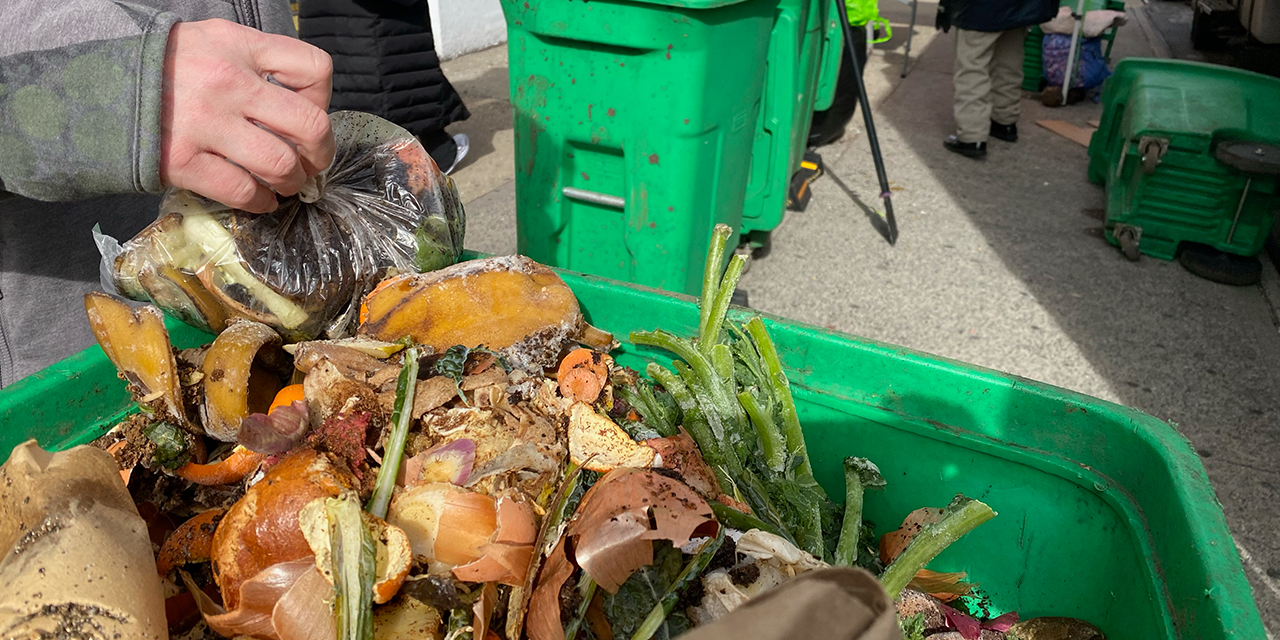
John Tierney joins Brian Anderson to discuss why composting and recycling persist despite the lack of evidence for their efficacy.
Audio Transcript
Brian Anderson: Welcome back to the 10 Blocks podcast. Today we’re joined by John Tierney to discuss what he calls the most nonsensical form of municipal recycling, which is composting. This is an environmentalist passion that he points out costs a lot of money for little benefit and plenty of downsides. Now, for decades, John has chronicled to problems not only with composting, but with recycling more broadly, going all the way back to a notorious 1996 article he wrote for the New York Times called “Recycling is Garbage.” More recently, John has written for City Journal on the subject with articles including among others, “Let’s Hold On to the Throwaway Society,” which was a defense of plastic bags and other disposable products. John’s a senior fellow at the Manhattan Institute. He’s a contributing editor of City Journal. He joins CJ after more than two decades as a reporter and columnist with the New York Times, and he’s the author of numerous books, including most recently, The Power of Bad: How the Negativity Effect Rules, and How We Can Rule It. So John Tierney, thanks very much for joining us.
John Tierney: Thank you. Brian.
Brian Anderson: For readers who don’t compost and may not even know what it is, can you just give a general description of what composting is and how it fits into the larger environmentalist framework of recycling and similar policies?
John Tierney: Well, the idea that and New Yorkers now are basing fines or will be soon if they don’t separate all their organic waste. What the city is demanding and what some other cities are also doing is you have to separate all your food scraps and also yard waste if you have that, and they all have to go into a separate bin that is collected separately and these are taken to composting facilities or in New York, some of it is being sent to other facility that will convert some of this organic waste into natural gas and some of it goes to composting facilities. Then they create compost that are sold to gardeners and other things. And of all the forms of recycling, I mean, I’ve written for a long time, as you said, about how much it costs, how expensive recycling is, how time consuming it is. I mean, when I talk about how expensive it is, I’m only talking about how much money New York City and other cities pay to do it, how much cheaper it would be to just send stuff to a landfill. The biggest cost of all, which back in that article wrote in the nineties is the cost of people’s time and having to do all this garbage sorting. And if you actually factor that in, I did these calculations about if you paid a janitorial wage for those few minutes a week that you spend sorting garbage, it’s just as absurdly, it’s more expensive than anything. It’s costs more than what the city is spending. There are some, cardboard and metals are more cost effective, but composting is the most expensive to collect and it yields the smallest benefits.
Brian Anderson: Let’s say a defender of composting was willing to concede that there are some practical drawbacks to the policy, but what is the environmental argument for it exactly? Somebody might say, yeah, this is a real burden on people perhaps, but it’s fundamentally important to do and it works.
John Tierney: Recycling has always been a solution in search of a problem. It has this intuitive appeal to people that see, we shouldn’t waste this. This is valuable material. But our intuitions, which is very wrong about this, and the original justification for the whole recycling movement was that we’re running out of space in landfills. We had a garbage crisis, and also there was this intuitive idea that you were running out of metals and paper and everything of natural resources. We have to conserve them because the populations growing. Both of these things were dead wrong, and there’s plenty of space in landfills. There are rural communities that benefit enormously from having landfills that are way out in the country somewhere. They’re surrounded by greenery and they pay enormous revenues to these towns, pay for great schools and provide a lot of benefits to the towns and the money. So there’s plenty of landfill space and we’re not running out of natural resources.
Commodity prices over the long haul tend to go down, if anything, because we get better at finding supplies. The original justifications have gone away. By now even environmentalists can see, yeah, we could just keep sending it to landfills and no, we’re not really running out of these materials. New York City and other places started this thinking, we’ll save money because this material that we recover from garbage will be so valuable that it’ll fetch a really high price. It’ll help pay for a waste disposal and waste processing. But it turned out that there’s just so little market for this stuff that the city has to pay people to take most of it off its hands, and then it costs so much more to collect this than the separate collections that it’s just a huge money problem. The justification they have now fallen back on, they’re trying to find another justification for it, is that when you recycle materials, you save some energy versus using new materials, and so there are fewer greenhouse emissions and you lower the carbon impact.
These are small savings for the most part. They’re very expensive. There are much cheaper ways to cut carbon emissions without forcing people to become garbage sorters, and even that rationale completely fails for composting. The Environmental Protection Agency estimates the greenhouse savings from various forms of recycling, and virtually all the savings come from recycling metals and cardboard and paper. And plastic, you save so little with plastic to offset the carbon impact of one round trip, a trip from New York to London in coach, you’d have to recycle 40,000 plastic bottles, and if you rinse them in hot water, the net effect would actually be higher greenhouse emissions because of the energy to heat that water. So even Greenpeace, as we’ve written in City Journal, has conceded that plastic recycling makes no sense. Here’s the thing, composting saves even fewer greenhouse gases than plastic and yard waste is much, much smaller still. So the greenhouse savings are really minuscule, and I suspect they’re actually non-existent because for instance, in New York to deal with this new composting edict, I’ve talked to people in their buildings, they have bought freezers in the hall to store this rotting food. It’s only collected once a week. Well, if you’ve factored in the energy that that freezer is taking up, I would think that the net result of our composting program is to increase greenhouse emissions, so there’s really no rationale for composting.
Brian Anderson: This would pose pretty significant challenge in an urban setting, especially for people living in apartment buildings, right? If you’re an elderly person, this is going to be a pretty significant pain, right?
John Tierney: New Yorkers have such small kitchens, they’ve already been ordered, you have to have a trash bin, but you have to have something for bottles and cans. We have to have something for paper. In my building for instance, we have very convenient trash shoots in the hall, and we have a lot of elderly people in the building, and it used to be you could just put your trash down the chute. We have some very frail people in our building, and they’ve now got to slip their bottles and cans and their newspapers down to the recycling bins, and now they’re going to have to be hauling bags of rotting food. Adding insult to injury is that New York had these onerous plumbing regulations that for a long time banned garbage disposals and very few buildings in New York allowed garbage disposals in the sink. So people don’t have that option either. It’s like New York wants to make handling waste as grubby and inconvenient as possible for people.
Brian Anderson: It’s really astonishing. So many ecological initiatives seem to follow this kind of pattern where it’s more about the image than about the practical considerations, let alone whether the policies actually work, and not to be too cynical about it, but other people must have come to these conclusions. Policymakers must have understood what you’re describing, and yet the composting push and some of these other environmental programs like the drive for plastic bags or plastic straws, they continue to go on, especially in cities. That raises the question, what kind of political and economic interests are driving these policies?
John Tierney: Right? Part of it is this gut appeal that people have, this feeling that they’re doing something virtuous, and I call it a sacrament. It’s a rite of atonement for the sin of excess. I bought a lot of stuff, but at least I’m reusing it. There’s that intuitive feeling that, so some people, voters will kind of go along with it, but the real political explanation at this point, I mean to me, it’s gotten so crazy because Howard Husock calculated in a report for the Manhattan Institute, the city could save $340 million a year by eliminating recycling, and the city is broke. That’s more than half the budget of the Parks department. You would think there would be politicians saying, look, we can’t afford basic services anymore. We got to cut these frills. Now, recycling has matured into very lucrative sector of what’s been called the “environmental industrial complex.”
There are waste handling industries, there are green energy firms that now lobby for these laws along with activist environmental groups. It’s a cause that keeps them in business too. The activists have jobs crusading for these things and fundraising with it, so there’s a lot of money there, and there’s staggering amounts of corporate welfare for this environmental industrial complex, the Inflation Reduction Act in 2022, they budgeted $400 billion for environmental initiatives including recycling, and other analysts say that the actual figure is going to be at least double that, and it might be $2 trillion over the next 10 years. So that’s a lot of money, and for instance, the composting in New York City, some of it is going to this waste-to-energy plan in Brooklyn that has just had massive cost overruns. It’s massively subsidized with tax credits and other subsidies. The state has renewable energy mandates, and so this facility gets to sell what I call the environmental version of indulgences.
Utilities have to buy credits from them. There’s a lot of money to be made in this industry thanks to all the government subsidies for it. I mean, that’s one big political explanation for it, and Bill de Blasio got campaign contributions from that industry. He was the one who started this, who signed the city on in 2015 to this zero waste agenda, and other cities like San Francisco have done that too, and it’s just a crazy agenda that we’re going to stop sending anything to landfill. When he did it, New York City was sending 3 million tons of trash a year to landfills, and we’re still sending that. You can’t possibly do this, but chasing this impossible goal is very lucrative for these special interests.
Brian Anderson: I wonder if there’s any opportunity for political pushback here. We do have a mayoral race coming up. This isn’t obviously one of the biggest issues facing New Yorkers, but it is, as you’ve just described, a kind of ridiculous set of policies that could easily be reformed.
John Tierney: This one has already aroused some popular anger. In fact, the city, this edict has been in effect, but it hasn’t been enforced at all, and most people haven’t done it, and then this month in April, they started issuing fines for it. They issued several thousand summonses, and this caused so much popular anger that the city backed down right away and said, well, you know what? We’re going to do some more education and we’re not going to do fines this year, so we can see that there is some anger at this, and I would think someone who’s saying, look, I want to save money. I want to stop you from having to handle all this grubby food and I’m going to put the money to making your park better. I think that would have some appeal for diehard progressives who like doing this. I mean, the other political appeal I think, as I mentioned in the City Journal article is I just think that as we show in the pandemic progressives and progressive politicians really love to boss people around, I think there’s suspects just in that and the idea that you’re telling people what to do with their scraps of food and intruding in their kitchen. To me, it’s crazy, but there are some people who get a lot of satisfaction on that. I do hope, as you suggested, someone will mention this in the mayoral race and maybe restore some sanity to the city.
Brian Anderson: As you’ve noted, there is a lot of money bound up with it. The recent article John wrote is called “New York City’s Composting Delusion.” You can find that on City Journal’s website. Our guest has been John Tierney. You can find his writings for City Journal on his author’s page, which will be linked in our description. You can also find City Journal on X @CityJournal and on Instagram @CityJournal_mi. If you’ve enjoyed this podcast, please give us a nice rating on iTunes. I’m also excited to announce that we’ve launched a brand new, twice weekly podcast called, simply enough, the City Journal Podcast, hosted by CJ’s Charles Lehman. It will explore the issues of the day with a rotating group of the Manhattan Institute’s policy experts. It drops every Monday and Thursday, so be sure to check it out on YouTube and subscribe. John, very, very good to have you on as always.
John Tierney: Thanks, Brian.
Photo by: Lindsey Nicholson/UCG/Universal Images Group via Getty Images
















